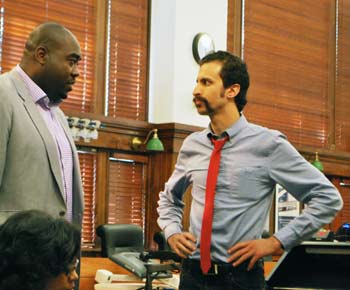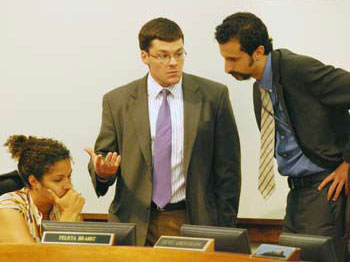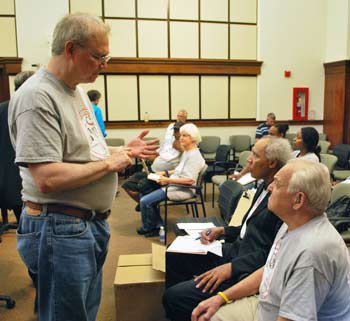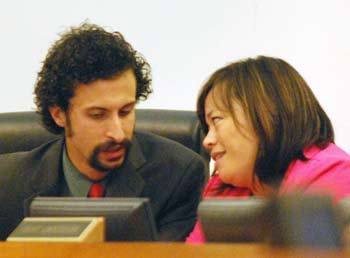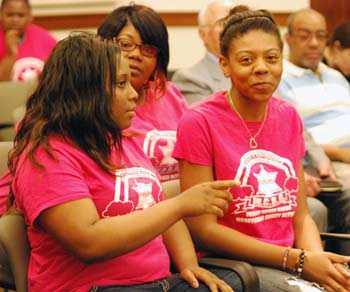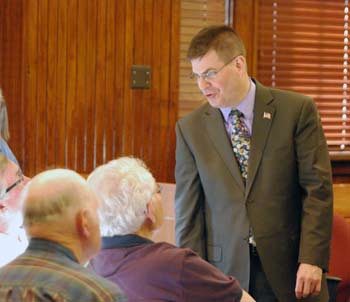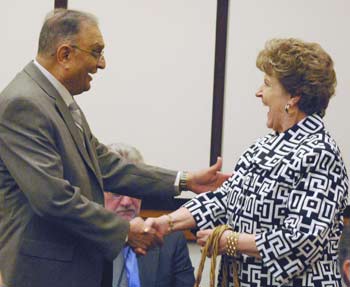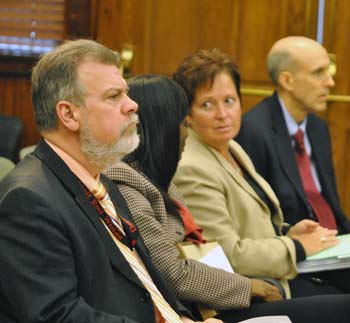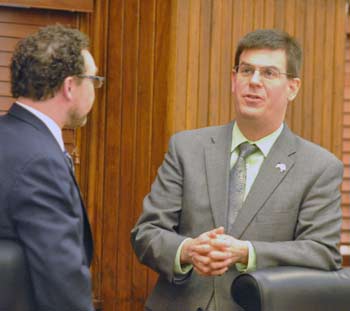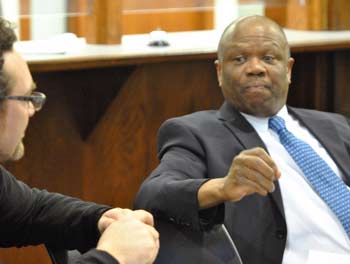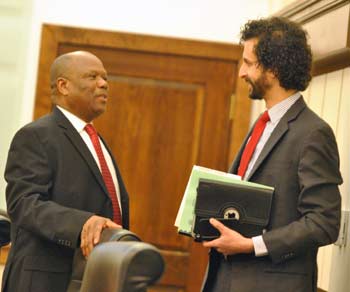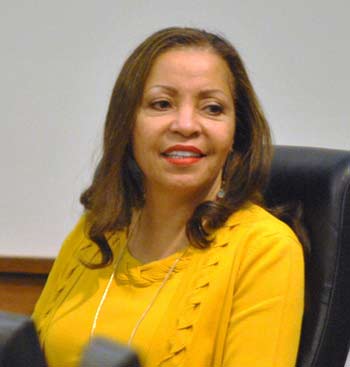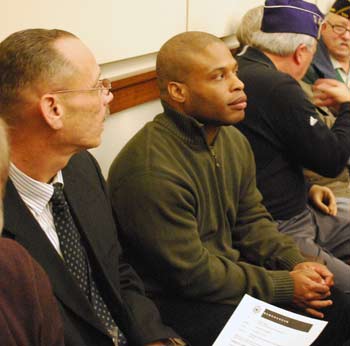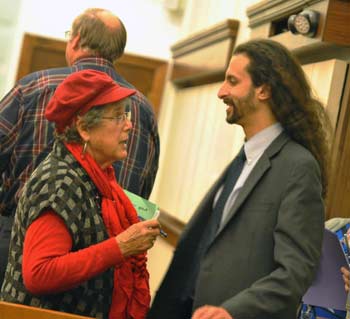At a May 2 working session lasting more than 3.5 hours, Washtenaw County commissioners were briefed on a bond proposal to fund the county’s pension and retiree healthcare plans, and debated the merits and risks of issuing up to $345 million in bonds – by far the largest issue in the county’s history.
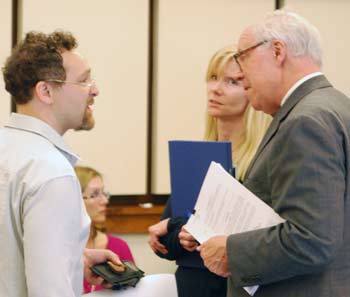
From left: Washtenaw County commissioner Conan Smith, Meredith Shanle of Municipal Financial Consultants Inc., and bond attorney John Axe, Shanle’s father. (Photos by the writer.)
The bonding is made possible by Michigan’s Public Act 329 of 2012, which the state legislature passed in October of 2012. [.pdf of Public Act 329] The law enables municipalities to issue bonds to cover unfunded accrued pension and retiree healthcare liabilities, but has a sunset of Dec. 31, 2014. The county faces a $30 million contribution toward these obligations in 2014, and is looking for ways to manage that obligation.
The most recent estimates put the county’s maximum retirement obligations at $340.8 million. New actuarial reports are due in June, however, and estimates could change. The board was presented with calculations for borrowing $344 million at an assumed average interest rate of 4%. The county would pay $239 million in interest over the life of the 25-year bond, for a total of $583 million in combined interest and principal.
John Axe of Axe & Ecklund, a Grosse Pointe Farms attorney who has served as the county’s bond counsel for decades, helped craft the state legislation that permits this type of bonding. He was on hand at the working session to describe the proposal and answer questions. “If you don’t issue the bonds,” Axe said, “you’re going to have horrible budget problems.”
County administrator Verna McDaniel has advocated for this move, in part to make long-term budgeting easier by having predictable bond payments. She raised the proposal publicly for the first time at the board’s April 17, 2013 meeting. However, Axe told commissioners that he’d been asked by the county administration to start looking into this possibility in November of 2012. He also met earlier this year with the board in closed session, when labor negotiations were discussed.
During the May 2 working session, several commissioners referred to the fact that the new 10-year labor deals approved earlier this year had been key to moving forward with this bond proposal. Allusions to that connection have been made at previous board meetings, but not directly stated. The crucial point was closing the defined benefit plan to employees hired after Jan. 1, 2014. Unless the defined benefit plans were closed, the county would not have been allowed by law to proceed with this type of bonding.
Also a factor are the new accounting standards of GASB 68, which require that unfunded liabilities be included in an organization’s financial statements for fiscal years beginning after June 15, 2014.
Some commissioners expressed concern that the bonding process, now that it’s public, is being rushed. “If I’m borrowing $350 million, I think we should take our time to ask appropriate questions,” said commissioner Ronnie Peterson. “That’s a lot of money.” He felt it was important to see updated actuarial estimates, but noted that based on the board’s discussion, “it’s like we’ve already made up our minds.”
Dan Smith lobbied to explore more options, rather than just one proposal, and raised the possibility of putting this issue before voters. “What we’re really trying to do is to manage our cash flow,” he noted. Smith also expressed skepticism about projections that the bond proposal would result in more than $100 million in savings for the county over 25 years, compared to the amount that the county would pay for its retiree obligations without bonding.
But Conan Smith argued that the board “set the course” when it approved those labor contracts and voted to close the defined benefit plans earlier this year. He acknowledged concerns about the timing, “but in part it has to move so fast because this board closed the plan, and we’re looking at a $30 million payment in 2014 if we don’t do something. So it was a choice we made willfully and with full knowledge and now we’re designing a fiscal strategy to minimize the severity of the impact on our budget.”
That specific budget impact was not discussed publicly when the board voted on the new labor contracts.
Axe also urged the board to act quickly, saying that the proposal is interest-rate sensitive. The proposal assumes that the county would borrow at an average annual interest rate of 4%, then invest the bond proceeds to earn an average rate of return of 6.5% over the 25-year period.
The proposal calls for the board to take an initial vote at its next meeting, on May 15, followed by final approval to issue a “notice of intent” on June 5. The board would also need to approve a state-mandated comprehensive financial plan in July, setting the amount of the bond issue. The county would then submit an application to the state Dept. of Treasury, which must approve the bond issue.
Some commissioners hope to get more input from experts – faculty at the University of Michigan business school, for example, or the county treasurer – who don’t stand to benefit from this bond issue. Because of these concerns, the county is expected to hire a third-party consultant, Public Financial Management Inc., to review the proposal.
In response to a question from Dan Smith, Axe told the board his firm would earn $485,000 in fees from this bond issue, at his standard rate. The county is also using Municipal Financial Consultants Inc. (MFCI) as the financial consultant on this proposal. Axe & Ecklund provides a 15% discount on its fees if the county hires MFCI as the financial consultant. MFCI president Meredith Shanle attended the May 2 working session. Though it was not mentioned at the meeting, Shanle is Axe’s daughter.
Board chair Yousef Rabhi stressed the importance of community engagement, and outlined plans for getting input – including a public presentation and possibly extra meetings. “Regardless of the decision that we make,” he said, “it’s important that the community is involved in that process.” [Full Story]




